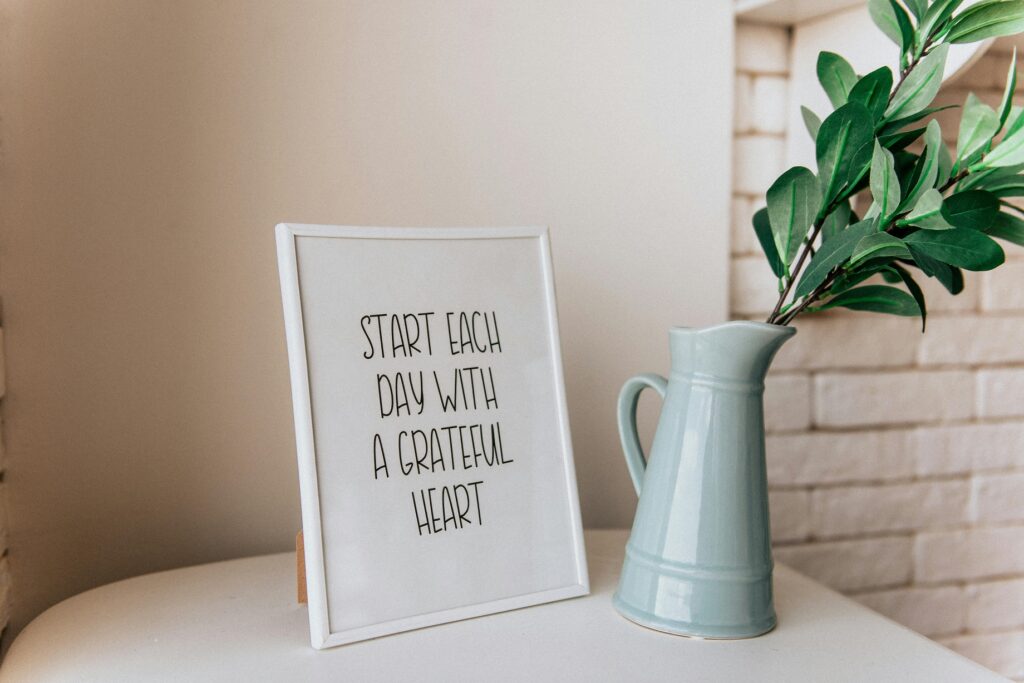When it comes to boosting your mental health, enhancing your positivity, and perhaps even convincing yourself that kale does taste good, you’ve probably encountered two heavyweights in the personal development world: gratitude and affirmations. These buzzwords get thrown around so often that one might suspect they’re in some sort of self-help showdown. So, in this epic battle of Gratitude Vs. Affirmations, which practice reigns supreme? Let’s dive in to find out which one truly deserves a permanent spot in your daily routine.
Gratitude Vs. Affirmations: What Are They, Really?
Before we start picking sides, let’s get to know our contenders.
What Is Gratitude?
Gratitude is the warm, fuzzy feeling you get when you realise that life isn’t entirely a dumpster fire. It’s the art of appreciating what you already have, whether it’s your morning coffee, a kind word from a stranger, or the fact that you miraculously remembered to put your phone on silent during that Zoom meeting.
Gratitude practices often involve journaling about things you’re thankful for, reflecting on positive moments, or simply not taking Wi-Fi for granted. The science behind gratitude is solid, with studies showing it can improve mood, reduce stress, and even make your relationships stronger (yes, even with your in-laws).
What Are Affirmations?
Affirmations, on the other hand, are like pep talks you give yourself. They’re positive statements designed to challenge negative thoughts and remind you that you’re capable of great things—or at least capable of not eating an entire packet of biscuits in one sitting. Examples include classics like, “I am worthy,” “I am confident,” or the ever-popular, “I am a magnet for success and abundance.”
The idea is that by repeating these statements, you can rewire your brain to believe them, thereby manifesting a better reality. It’s the verbal equivalent of putting on a superhero cape (minus the awkward looks from your neighbours).
The Science Behind Gratitude Vs. Affirmations
Gratitude: Backed by Neuroscience
Numerous studies show that practising gratitude can rewire your brain. MRI scans reveal that gratitude activates the prefrontal cortex, which is associated with decision-making and social interactions. It also boosts dopamine and serotonin—your brain’s feel-good chemicals.
In practical terms, this means that gratitude can help you stop obsessing over that one embarrassing thing you said at a party three years ago. Instead, you’ll focus on the fact that at least your outfit was on point.
Join Our Mailing List
Register now to get our hints and tips newsletter directly to your inbox
Affirmations: Brainwashing for the Better?
Affirmations, too, have their share of scientific backing. Research suggests that self-affirmation activates the brain’s reward centres. It’s like giving yourself a mental high-five. However, there’s a catch: affirmations work best when they align with your existing beliefs. If you’re saying, “I am a billionaire,” but you’re simultaneously stressing over the price of oat milk, your brain might call your bluff.
Pros and Cons of Gratitude Vs. Affirmations
The Case for Gratitude
Pros:
- Gratitude is simple and low-effort. No need for elaborate rituals; just think, “Wow, my cat didn’t scratch me today. Life is good.”
- It shifts your focus from what you lack to what you have, which is a game-changer for anyone prone to endless comparisons on Instagram.
- It’s scientifically proven to improve sleep, lower blood pressure, and reduce symptoms of depression.
Cons:
- Gratitude can sometimes feel a bit… repetitive. How many times can you write, “I’m grateful for coffee” before it starts to lose its magic?
- If you’re in a bad mood, gratitude can feel forced, like being asked to smile for a photo when you’ve just stepped in gum.
The Case for Affirmations
Pros:
- Affirmations can boost self-esteem and motivation, making you feel like a rock star (or at least a competent adult).
- They’re flexible. You can tailor them to your specific goals, whether that’s nailing a job interview or resisting the urge to scroll TikTok at 1 a.m.
- They encourage forward-thinking and help you visualise the person you want to become.
Cons:
- If your affirmations are too unrealistic, they can backfire, leaving you feeling more like a fraud than a hero.
- They require consistency and a certain level of emotional buy-in. Simply mumbling, “I am amazing” while half-asleep won’t cut it.
Gratitude Vs. Affirmations: Which Is Easier to Stick With?
If you’re someone who struggles with commitment (looking at you, half-finished gym memberships), the ease of sticking to a practice is crucial. Gratitude has the upper hand here. It’s straightforward and doesn’t require much beyond basic awareness. Affirmations, while powerful, can feel a bit awkward at first. After all, telling yourself, “I am radiant” in the mirror when you’re sporting bedhead takes some getting used to.
Combining Gratitude and Affirmations: The Ultimate Power Couple
Why choose one when you can have both? Gratitude and affirmations aren’t mutually exclusive; in fact, they complement each other beautifully. Think of them as peanut butter and jam, or Netflix and snacks.
Here’s how you can combine them:
- Start your day with gratitude by jotting down three things you’re thankful for.
- Follow it up with a few affirmations tailored to your goals, like, “I am grateful for my resilience, and I am becoming stronger every day.”
- Repeat your affirmations throughout the day. Bonus points if you say them out loud with enthusiasm—jazz hands optional.
When to Use Gratitude Vs. Affirmations
Opt for Gratitude If:
- You’re feeling stuck in a negative mindset and need a quick mood boost.
- You want to cultivate a sense of contentment and appreciation.
- You’re not quite ready to stare into a mirror and declare, “I am fabulous.”
Opt for Affirmations If:
- You’re working towards specific goals and need a confidence boost.
- You struggle with self-doubt and want to reinforce positive beliefs.
- You secretly enjoy feeling like the main character in a motivational montage.
Final Thoughts on Gratitude Vs. Affirmations
In the ultimate showdown of Gratitude Vs. Affirmations, the winner depends on your personal preferences and goals. Gratitude is like a cosy blanket, wrapping you in appreciation for life’s simple joys. Affirmations are more like a megaphone, shouting your potential into the universe.
But why choose? Incorporating both into your daily routine can supercharge your mental well-being. So, grab a journal, practice some gratitude, and belt out those affirmations. Who knows? With a bit of consistency, you might just transform your mindset—and your life.




